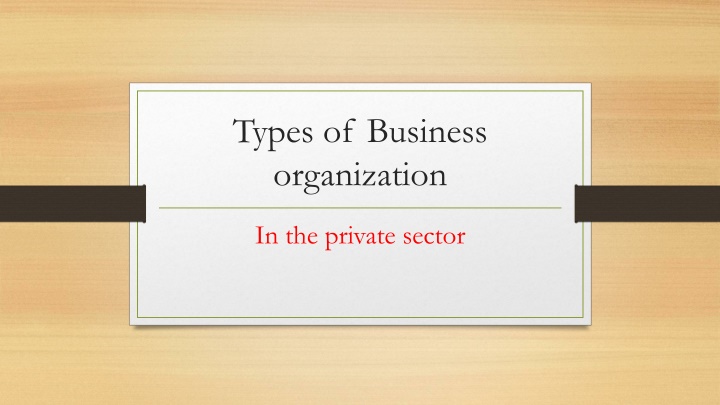Overview of Business Organization in the Private Sector
Explore the types of business organizations in the private sector, including sole traders, partnerships, private limited companies, public limited companies, franchises, and joint ventures. Learn about the distinctions between public and private sector organizations, reasons for choosing different business forms, and key definitions related to ownership, liability, and legal status.
Download Presentation

Please find below an Image/Link to download the presentation.
The content on the website is provided AS IS for your information and personal use only. It may not be sold, licensed, or shared on other websites without obtaining consent from the author.If you encounter any issues during the download, it is possible that the publisher has removed the file from their server.
You are allowed to download the files provided on this website for personal or commercial use, subject to the condition that they are used lawfully. All files are the property of their respective owners.
The content on the website is provided AS IS for your information and personal use only. It may not be sold, licensed, or shared on other websites without obtaining consent from the author.
E N D
Presentation Transcript
Types of Business organization In the private sector
Public & private sector organisations Public sector organisations are those owned and run by the government. Their main objectives will be to provide a service for the general public. Example: the National Health Service (NHS) Private sector organisations are those owned and run by any private individuals These types of firms will generally set as their main objectives to maximise sales and profit. Example: Tesco, Sainsbury s, Sony, Ford
There are several main forms of business organization in the private sector 1) Sole traders 2) Partnerships 3) Private limited companies 4) Public limited companies 5) Franchises 6) Joint ventures
Reasons for choosing different forms of business 1) Ownership: Who owns the business. 2) Business size. 3) Legal regulations: legal requirements to set up the business. 4) Capital: the money invested into a business by the owners 5) Liability: who is responsible for the business s debts.(limited liability /unlimited liability) 6) Separate legal identity. (incorporated businesses / unincorporated businesses)
Definitions to learn Limited liability: debts incurred by business may be paid only from the amount the owners invested. Unlimited liability: debts incurred by business may be paid from owner s personal assets. Incorporated businesses: are companies that have separate legal status from their owners.(the company will continue if one of the owners die). Unincorporated businesses: is one that does not have a separate legal identity.
Sole trader: is a form of business owned and operated by just one person Sole trader is the most common form of business organization because there are few legal requirements to set it up.(few legal regulations must be followed). Advantages Owner in complete control Disadvantages The business is not a separate legal unit .no continuity). Unlimited liability . No sharing of profits
Partnership: is a form of business in which two or more people agree to jointly own a business. The partners will contribute to the capital of the business and will share any profits made. A partnership can be set up very easily. Verbal agreement: to ask someone you know to become your partner in the business. Partnership agreement: is the written document between business partners. Its not essential but its always recommended because without this document the partners may disagree on who put most capital in the business and who is entitled to more of the profits.
Advantages Disadvantages Able to raise capital from partners Unlimited liability Responsibilities shared Unincorporated business(The business is not a separate legal unit): if one of the partners died , the partnership would end. More ideas from new partner(s) Partners motivated to work hard because they would benefit from the profits.
Private limited companies (LTD): are businesses owned by shareholders but they cannot sell shares to the public(only friends and relatives) Shareholders : are the owners of a limited company . They buy shares which represent part-ownership of the company. Advantages Disadvantages Raise capital from sale of shares Limited liability for shareholders Separate legal identity (continuity) Cannot sell shares to public Legal formalities Accounts are less secret than either for a sole trader or partnership Not easy to transfer shares
Public limited companies (PLC):are businesses owned by shareholders but they can sell shares to the public and their shares are tradeable on stock exchange. Public limited companies are not in the public sector of industry. Advantages Can sell shares to public Limited liability Disadvantages Legal formalities Disclosure of accounts and other information Divorce between ownership and control (shareholders own , mangers and directors control) Expensive to go public Continuity Rapid expansion possible
Control and ownership in public limited companies In all sole trader businesses and partnerships the owners have control over how their business is run (decisions ,achievements and aims). This also the case in the most private limited companies which have relatively few shareholders so they can ensure that their decisions are passed at all meetings .With public limited companies the situation is different because there are thousands of shareholders , so its impossible for all of these people to be involved in taking decisions although they are all invited to attend the: Annual General Meeting : is a legal requirement for all companies . Shareholders may attend and vote who they want to be on the board of directors for the coming year.
Franchise: is a business upon the use of the brand names ,promotional logos and trading methods of an existing successful business The franchisee buys the license to operate this business from the franchisor . Franchise ex: McDonald s To the franchisor The management of the outlets is the responsibility of the franchisee All products sold must be obtained from the franchisor To the franchisee The franchisor pays for advertising Advantages The chances of business failure are much reduced because a well-known products is being sold
To the franchisor To the franchisee Poor management of one franchised outlet could lead to a bad reputation for the whole business. Less independence than with operation a non-franchised business. Disadvantages The franchisee keeps profits from the outlet. License fee must be paid to the franchisor and possibly a percentage of the annual turnover.
Joint Venture: is where two businesses or more start a project together, sharing capital, risks and profits Advantages of joint ventures Disadvantages of joint ventures Sharing of costs important for expensive projects such as new aircraft The profits have to be shared with the joint venture partner. Risk are shared Disagreement over important decisions might occur
Business organizations in the public sector A public corporation is a business in the public sector is owned and controlled by the state (government). Advantage of public corporations: Important public services , non-profitable but still be made available to the public. Disadvantage of public corporations: There are no private shareholders to insist on high profits and efficiency.























